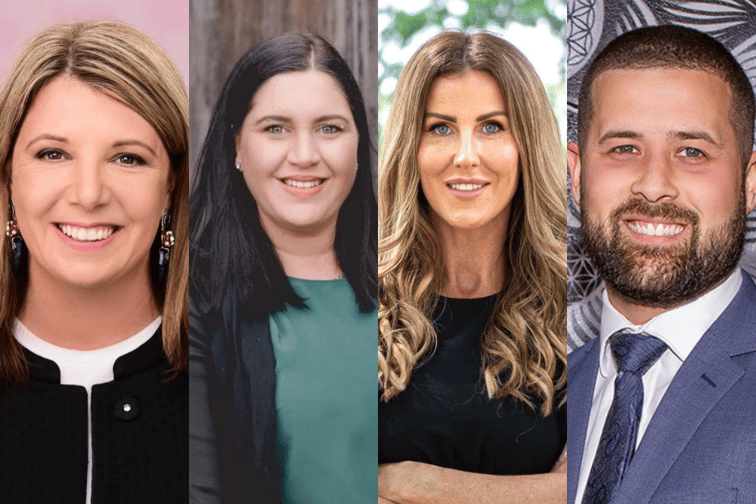

The Matildas have ignited a nationwide wave of enthusiasm and inspiration with their remarkable achievements both on and off the soccer field during this year's FIFA Women’s World Cup.
But beyond their sporting prowess, could the Matildas' success be a catalyst for broader change in gender equality and recognition?
This question reverberates across various sectors, including the financial services industry, where women's representation, particularly in roles such as mortgage broking, remains disproportionately low.
“You can’t be what you can’t see,” said Jane Counsel (pictured above, far left), co-founder of business coaching consultancy Thrive4Women. “It’s a wonderful thing we are seeing at the moment for women in this country.”
The Matildas' journey has captured millions nationwide, with the quarterfinal game against France becoming Australia’s biggest streaming event and the top-rated sports program since Cathy Freeman won gold at the 2000 Olympics.
The bandwagon is growing, with broadcasters and sponsors salivating about the thought of their bonuses, and even the Prime Minister pledging a public holiday if the Tillies had won.
Former Socceroo Craig Foster AM summed it up well: "The Matildas are leading a social movement that resonates with everyone who believes in empowerment and equality. They're not just playing a game; they're shifting paradigms."
But could this paradigm shift spill over into other fields such as mortgage broking?
At the MFAA’s Women in Finance Broking event held in Sydney on Wednesday, Counsel asked a panel of mortgage industry experts, “how important are our female role models and the critical masses of females to show what’s possible to other young women and see this industry as a career path”?
Ashleigh Pakis (pictured above, centre left), director of Panache Financial and NSW Regional Broker of Year, said the Matilda’s newfound cultural significance highlighted the importance of building an inclusive community among women no matter what you are doing.
Pakis said she had suffered from “terrible imposter syndrome” when she started broking in a male-dominated culture and environment in regional New South Wales.
“I didn’t really have a lot of people. Then I met (mortgage broker) Nicole Cannon online in a group meeting and she was so helpful. And from that moment, I knew I had to meet with someone in my industry every month to work out where I was going to go and what I was going to do,” Pakis said.
An industry culture that is not inclusive of women was the second biggest barrier in the mortgage industry, according the MFAA’s latest Opportunities for Women survey – behind unconscious beliefs about gender roles in the workplace.
However, imposter syndrome is not just an issue for women in financial services – but for many women working in a variety of fields.
Even Cortnee Vine, Australia’s hero who thumped home the winning penalty on Saturday night, had questioned her place in the team before the tournament began.
Similarly, Pakis drew comparisons to her horse-riding group, where women are the majority.
“It’s so competitive and it’s a really different environment. I think community is what it builds and people should learn from each other’s mistakes and passions because no matter what we do, ultimately, we are all here to make a difference and bring something different to the table,” Pakis said.
“I think that’s what we have to embrace with women is that we bring something completely different to the table than men.”
Alissa Childs (pictured above, centre right), director of Sydney-based brokerage Two Birds One Loan, said to the panel that the hysteria around the Matildas brings talk about equality and women’s rights into the public consciousness.
“The whole country is talking about these women. Typically, the women are not aired or put up on a pedestal in the same way the men are,” Childs said.
Childs said her team had met up with a professional women’s soccer player to discuss issues around women’s rights.
“When we heard about the pay discrepancy between the female and the male players our jaws hit the ground,” she said.
The gender pay gap for the FIFA World Cup is US$370 million, reported by The Conversation. Overall, Australia’s gender pay gap is 22.8%, according to the Workplace Gender Equality Agency (WGEA).
“I think what the Matilda’s are doing is bridging that gap between men and women in sport.”
In terms of the mortgage industry, Childs said she has seen a shift in businesses where women’s rights are recognised and representation is increased.
Financial and insurance services has seen the largest decrease in the gender pay gap in recent years, dropping over 9% since 2015, WGEA data showed. However, the gap remains among the highest industries at 28.6% only behind construction (29%).
“Macquarie Bank, for example, want at least 50% of their management team female and I think we are seeing that across more major institutions now,” Childs said.
One business that has strived to make a difference is Sydney-based brokerage Birdie Wealth, which has 74% of its team and half of its mortgage brokers identify as women.
Nathan Smith (pictured above, far right), general manager at Birdie Wealth, drew parallels between the paths being paved for women in soccer and in finance.
“The operations and marketing manager at Birdie is a soccer player and actually got a scholarship to play in the USA. It’s interesting hearing what she went through eight years ago and the limited pathways she had,” Smith said.
“What we are seeing that through women in finance is aggregators and the industry are increasingly providing pathways.”
Smith said his female brokers are often their “toughest critics” and he strives to create a flexible and supportive environment to help them thrive.
“They beat themselves up and our chats are always around reminding them that they are doing a fantastic job and to keep doing what they are doing,” Smith said.
“It’s about having that supportive community around you to keep pushing you forward.”
What do you think about the Matildas’ success? Comment below.
